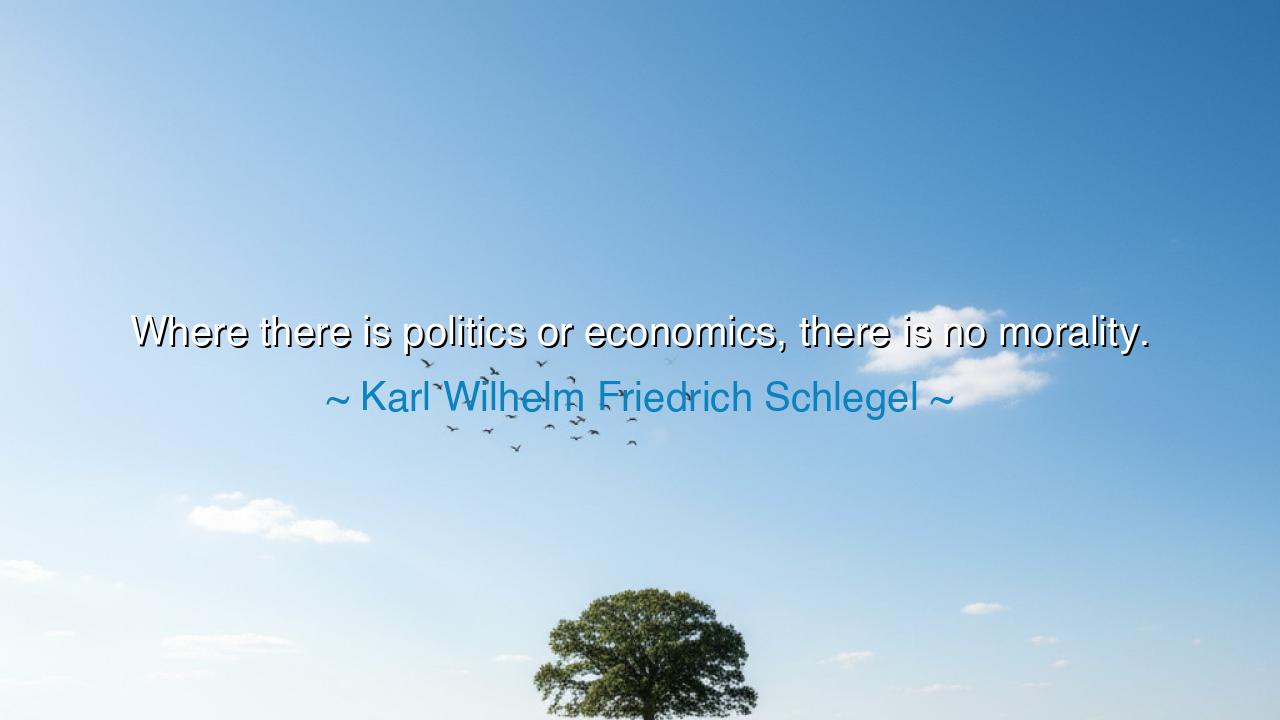
Where there is politics or economics, there is no morality.






The words of Karl Wilhelm Friedrich Schlegel — “Where there is politics or economics, there is no morality” — fall like a stern judgment upon the affairs of humankind. He unmasks the harsh truth that when politics and economics rule, they often trample virtue beneath their feet. For these realms deal in power, wealth, and survival, and their laws are not written in the language of justice, but in the tongue of advantage. In them, morality is not absent because men deny it, but because it is twisted to serve ambition.
To understand this saying, one must see that politics is the struggle for rule, and economics the struggle for resources. In such contests, the noble ideals of truth and fairness are easily cast aside, while compromise, deception, and calculation take their place. Schlegel’s cry is not against humanity itself, but against the illusion that virtue reigns in these domains. He warns that to expect morality in them is to search for sunlight in the heart of the abyss.
History offers many grim confirmations. Consider the story of the Treaty of Versailles after the First World War. It was clothed in the garments of peace, yet it was driven more by vengeance and the hunger for reparations than by the spirit of justice. The victors, consumed by politics and economics, sowed seeds of resentment that would grow into the next great war. In this, Schlegel’s words shine with bitter clarity: where rulers bargained in power and coin, morality found no dwelling.
Yet even as he speaks this truth, there lies within it a challenge. If these realms are prone to corruption, then the duty of the wise is to guard their hearts against their snares. The ancients often told their rulers that the throne should serve the people, not the ruler’s pride; but again and again, thrones became seats of greed. Thus, Schlegel’s words serve as a reminder that morality must be preserved in the soul of the individual, for it seldom survives in the structures of power.
Therefore, O seekers of wisdom, do not be deceived: in the markets of wealth and in the courts of rulers, you may not always find morality. But let this truth not make you despair; rather, let it sharpen your vigilance. For morality belongs not to systems but to souls, not to crowns but to consciences. And if each man and woman holds fast to virtue, then even in the shadows of politics and economics, light may yet be carried into the world.






TLTHAIPHUONG LE
Schlegel’s quote seems to suggest that politics and economics are morally neutral by nature, which is an interesting idea. But is it possible for these systems to evolve in a way that aligns with morality? Can political and economic systems be designed to be more equitable and ethical, or is the nature of these systems inherently exploitative? What would it take to create a truly moral system of governance and economy?
PTNguyen Thi Phuong Tran
I understand where Schlegel is coming from, especially when we look at how often politics and economics seem driven by self-interest and power dynamics. But if we accept his statement, does that mean we have to give up on the idea of ethical leadership in these areas? Are we doomed to a system where morality is always compromised? Or can we find a way to infuse politics and economics with more moral integrity?
NNNhung Nguyen
I’m torn on this one. On one hand, it’s easy to argue that politics and economics often lack a moral compass, as we see in corruption and inequality. But on the other hand, can’t political systems evolve to reflect more ethical values? If we look at policies aimed at social justice or sustainability, isn’t there room for morality to exist within these spheres? Could Schlegel’s claim be too cynical, or is it rooted in historical reality?
AMAnh Minh
Schlegel’s view makes me wonder if we can ever separate the moral aspect from politics or economics. Historically, many decisions in these fields have led to exploitation and inequality, so is there any truth to his claim? But doesn’t this mean we’ve also seen moments where politics and economics do reflect moral principles, like during the Civil Rights movement or social welfare programs? How do we balance these two forces?
TTThanh Thao
This quote is quite bold. Schlegel seems to be saying that politics and economics are inherently detached from morality, which feels a bit extreme. Is it possible for politics and economics to ever truly prioritize ethical considerations? Or do these systems inevitably prioritize power and resources over the well-being of individuals? Can we ever reconcile the pursuit of power with the concept of morality, or are they always in opposition?